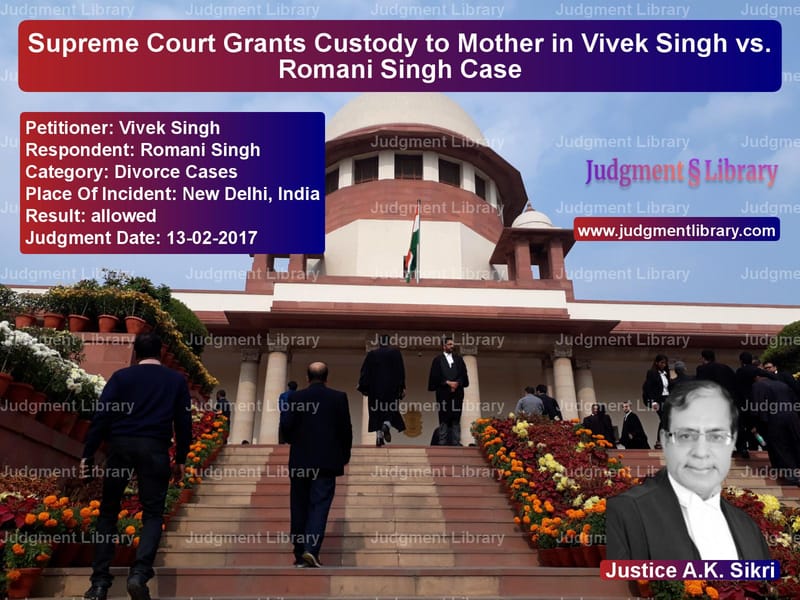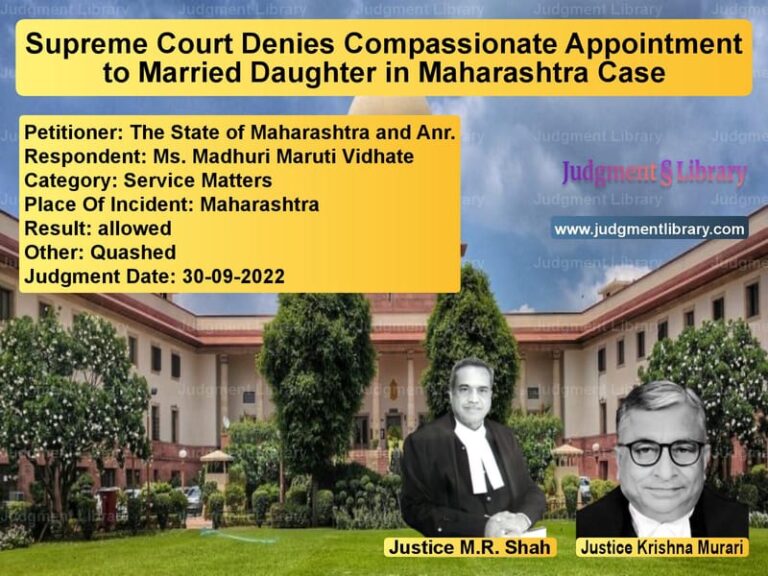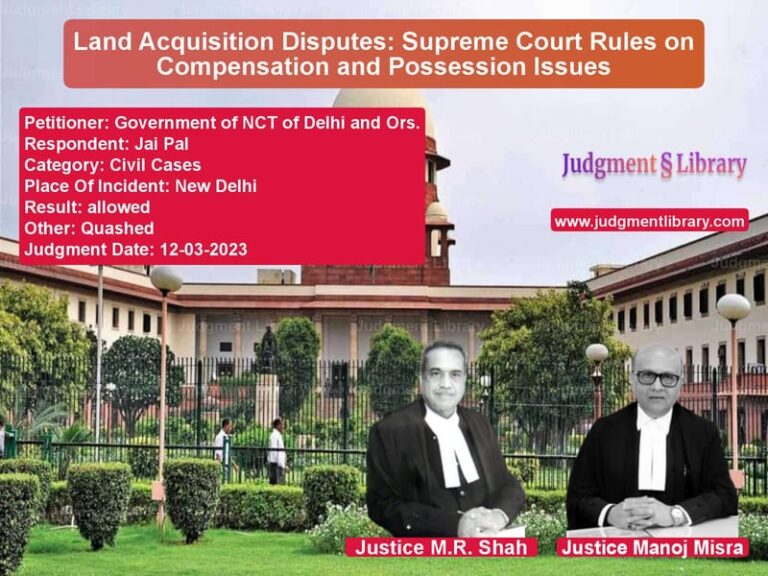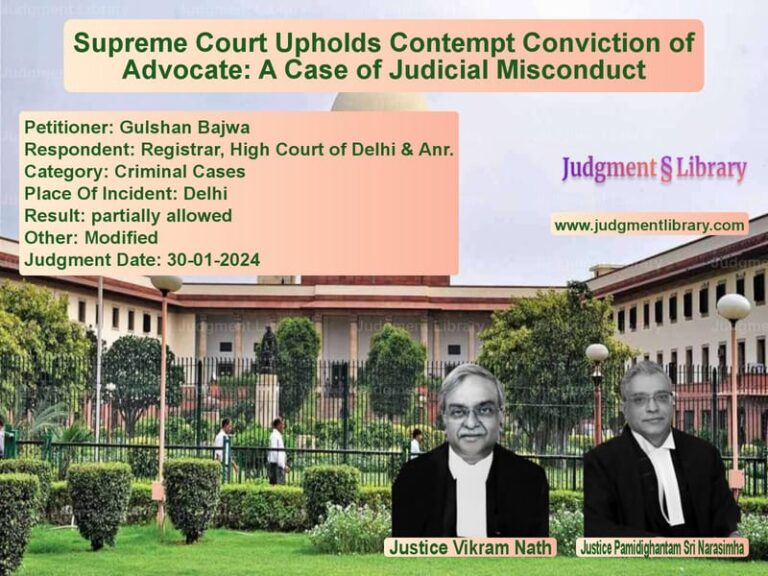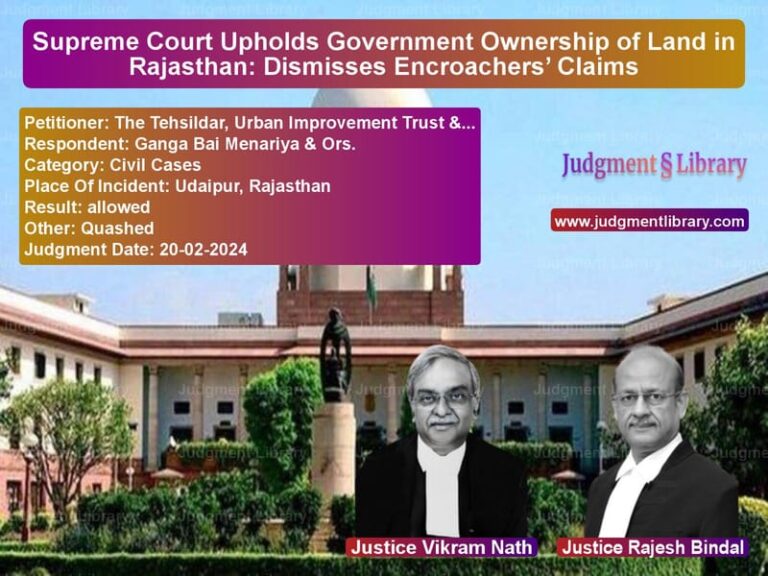Supreme Court Grants Custody to Mother in Vivek Singh vs. Romani Singh Case
The Supreme Court of India, in its judgment dated February 13, 2017, ruled in favor of Romani Singh, granting her the custody of her minor daughter Saesha Singh. This judgment in Vivek Singh vs. Romani Singh reaffirms the principle that the welfare of the child is paramount in custody battles. The Court overruled the previous decision of the Family Court, which had granted custody to the father, and directed that the mother should be given the opportunity to raise the child for at least one year.
Background of the Case
Vivek Singh, an army officer, and Romani Singh, a teacher at Kendriya Vidyalaya, were married on November 25, 2007. Their daughter, Saesha Singh, was born on October 29, 2008. However, their marital relationship soon deteriorated, and in August 2010, Romani left the matrimonial home. She alleged that she was forced to leave after a domestic altercation, during which Vivek retained custody of the child.
On August 26, 2010, Romani filed a petition under the Guardians and Wards Act, 1890, seeking custody of Saesha. She argued that she had been the child’s primary caregiver since birth and was in a better position to provide a nurturing environment. The Family Court, however, dismissed her petition, ruling in favor of Vivek Singh.
Petitioner’s (Mother’s) Arguments
Romani Singh, seeking custody of her daughter, argued that:
- She had been the primary caregiver and had raised Saesha since birth.
- As a schoolteacher, she had a stable job with regular hours, allowing her to devote sufficient time to her child.
- Vivek Singh’s military duties required him to be away from home frequently, and the child was mostly looked after by domestic staff.
- The principle of welfare of the child should be the paramount consideration.
- Saesha’s well-being would be best ensured under the care of her mother, who could provide emotional stability.
Respondent’s (Father’s) Arguments
Vivek Singh, opposing the custody transfer, argued that:
- Since August 2010, Saesha had been under his exclusive care and was comfortable living with him.
- Romani had voluntarily abandoned the child when she left the matrimonial home.
- He had provided financial support and ensured Saesha’s education and well-being.
- Saesha had expressed a preference to continue living with him.
Supreme Court’s Observations
Justice A.K. Sikri, delivering the judgment, made key observations:
“The welfare of the minor shall be the paramount consideration.”
“A child’s best interest must be considered with a long-term perspective, ensuring a nurturing and stable environment.”
“The role of a mother in shaping a child’s early years is irreplaceable, especially in the case of a girl child.”
The Supreme Court noted that while Saesha had expressed a preference to stay with her father, this might have been influenced by prolonged separation from her mother. The Court emphasized that continuous contact with the mother was essential for the child’s emotional well-being.
Final Verdict
After reviewing the evidence, the Supreme Court ruled:
- Saesha’s custody should be transferred to Romani Singh for one year, beginning with the next academic session.
- She should be admitted to the school where her mother teaches to ensure emotional stability.
- Vivek Singh would have structured visitation rights, including weekends, vacations, and birthdays.
- The matter would be reviewed after one year to assess the impact of the custody arrangement.
Impact of the Judgment
The ruling reinforced several legal principles:
- The welfare of the child is the most critical factor in custody decisions.
- Children should not be deprived of the emotional support of both parents.
- Even if a child expresses a preference, courts must assess whether the choice is made under external influences.
- Shared parenting should be encouraged through structured visitation rights.
Conclusion
The Supreme Court’s decision in Vivek Singh vs. Romani Singh set a strong precedent for child custody cases, reinforcing the principle that a child’s welfare takes precedence over parental claims. The ruling recognized the importance of both parents in a child’s upbringing while ensuring the mother’s primary caregiving role was restored.
Don’t miss out on the full details! Download the complete judgment in PDF format below and gain valuable insights instantly!
Download Judgment: Vivek Singh vs Romani Singh Supreme Court of India Judgment Dated 13-02-2017.pdf
Direct Downlaod Judgment: Direct downlaod this Judgment
See all petitions in Child Custody
See all petitions in Domestic Violence
See all petitions in Mutual Consent Divorce
See all petitions in Judgment by A.K. Sikri
See all petitions in allowed
See all petitions in supreme court of India judgments February 2017
See all petitions in 2017 judgments
See all posts in Divorce Cases Category
See all allowed petitions in Divorce Cases Category
See all Dismissed petitions in Divorce Cases Category
See all partially allowed petitions in Divorce Cases Category

